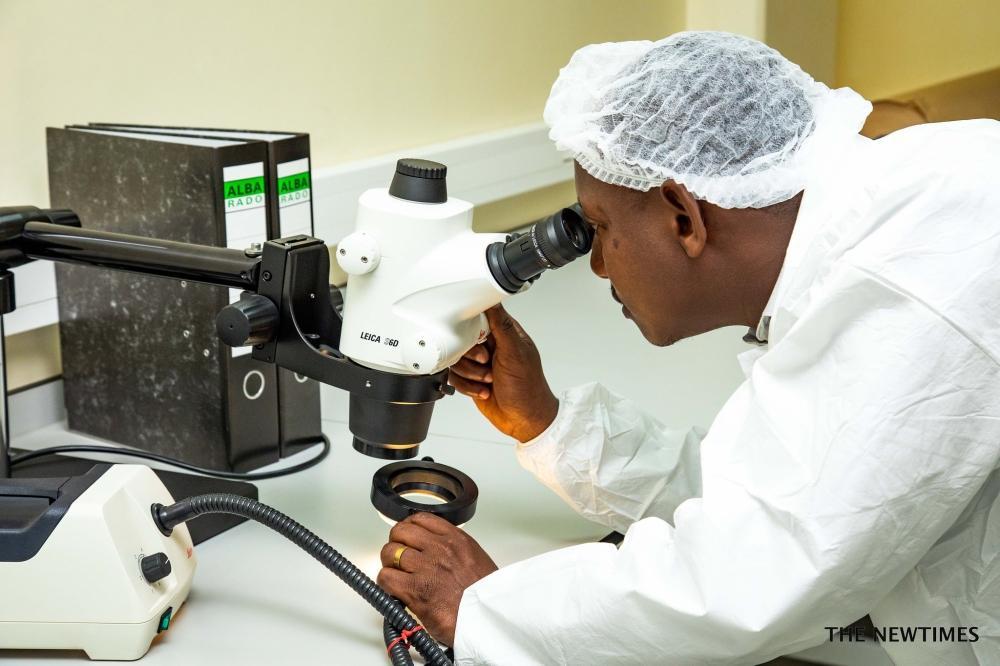Africa-Press – Rwanda. Rwanda is combating cancer and other non-communicable diseases (NCDs) by embracing genomics and artificial intelligence (AI) as game-changing tools for early detection and treatment.
Genomics is the study of an organism’s complete set of DNA, including all of its genes and their interactions with each other and the environment, according to the journal The Lancet.
A lab expert works at Kacyiru Hospital in Kigali. Craish Bahizi
According to health experts, integrating genomic technologies into Rwanda’s healthcare system will not only enhance diagnosis but also pave the way for precision medicine tailored to each patient’s genetic profile.
The Minister of Health, Dr Sabin Nsanzimana, recently emphasized that early diagnosis and early detection remain some of the biggest challenges in the fight against cancer and NCDs.
Speaking at a recent meeting of researchers and scientists in genomics, he said this field and AI should be at the center of the country’s health system.
“Early diagnosis and early detection for cancer is a problem. We should develop solutions to address this. For cancer, heart disease, and other NCDs, genomics has a place and it’s needed,” Nsanzimana said.
He reaffirmed the government’s commitment to advancing AI-driven genomic research as a key element of Rwanda’s modern healthcare.
“We plan that Kanombe Military Hospital will reach full operational capacity as a cancer scanning and diagnostic centre within the next three months, further expanding Rwanda’s network of oncology services,” he noted.
The hospital will complement the planned expansion of the Butaro Cancer Center of Excellence in Burera District and strengthen the country’s cancer detection capacity.
Currently, half of Rwanda’s cancer patients are diagnosed at stage three, a situation the Minister described as “one of the biggest obstacles” to effective treatment.
He said that enhancing early detection through genomic technology and AI will allow clinicians to identify risk factors earlier and tailor treatment to each patient’s genetic profile.
“Rwanda is determined to make genomics and artificial intelligence a national health and scientific priority,” he said.
“We are already applying genomics almost every day, in outbreaks, surveillance, and clinical management. The future of medicine is guided by these technologies; they make diagnosis and treatment more precise,” he noted.
Rwanda has already embarked on institutionalizing genomics through the establishment of a National Genomics Center within the National Reference Laboratory.
The initiative aims to strengthen the country’s diagnostic capacity for cancer, infectious diseases, and other NCDs, while training a new generation of Rwandan scientists in genomic science and bioinformatics.
Dr Nsanzimana highlighted the strong link between genomics and artificial intelligence, noting that both technologies are redefining how diseases are detected and treated.
“AI and genomics are connected; both are the future [of medicine], and both are priorities for us,” he said. “They are shaping the next generation of precision medicine, where decisions are guided by data and genetic insight.”
David Zapol, co-founder of the nonprofit Goodlife Access, argued that AI is indispensable in genomic research, given the enormous complexity of genetic data.
“Each human genome contains around three billion base pairs,” Zapol said in an interview with The New Times. “Large-scale studies can involve thousands of genomes. AI enables us to analyze this vast data efficiently and uncover patterns that would otherwise remain invisible.”
Zapol noted Rwanda’s universal healthcare coverage, which reaches over 90 percent of the population, has a strong foundation for equitable access to genomic medicine.
“The journey doesn’t stop here,” he said of his organisation’s activities in Rwanda. “We are partnering with the government to expand access to public health services through a nationwide network of clinics and pharmacies.”
He said generative AI could soon transform genomics by creating new analytical tools to interpret biological data, ushering in what he called “the new scientific frontier of generative genomics.”
Prof Nicaise Ndembi of the International Vaccine Institute placed genomics within the broader context of Africa’s Agenda 2063, describing it as “the foundation for our health sovereignty.”
“Without genomics, we cannot control diagnostics, therapeutics, or vaccines,” he said. “We can now predict the severity and risk of occurrence for most pandemics using AI and genomic models, which helps us prepare better and allocate resources efficiently.”
Prof. Ndembi noted that Africa now produces more than 150,000 viral genome sequences, a dramatic leap from fewer than three before the COVID-19 pandemic. He urged greater investment in bioinformatics, genomic infrastructure, and workforce development.
Prof Leon Mutesa, a professor in the Department of Clinical Biology at the University of Rwanda’s College of Medicine and Health Sciences, explained that the reason certain diseases like cancer can be hereditary is that specific genetic materials are passed down from parents to offspring.
“Different types of cancer, such as breast, cervical, prostate, and colon cancers can be inherited. That’s why genomic techniques are crucial for early detection,” Mutesa told The New Times.
Through genomics, one can undergo genetic testing to identify the composition of their genes and determine if they carry mutations that may cause cancer. This allows for early detection, since most cancers tend to appear later in life.
Mutesa added that even for cancers that are not hereditary, detection can still be difficult, which makes genomic screening important. By examining a person’s DNA, it becomes possible to identify cancerous changes at their very early stages.
“All cancers share one characteristic: they take time to develop,” said Mutesa. “It’s therefore best to detect them as early as possible, because once the disease has advanced, it becomes much harder to manage,” he said.
For More News And Analysis About Rwanda Follow Africa-Press






